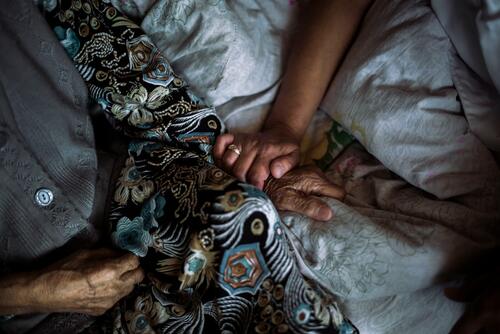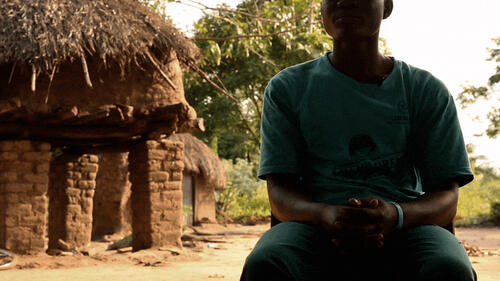Interview with Amin Lamrous, MSF’s palliative care specialist.
People mostly see palliative care as providing drugs to alleviate pain in the last moments of life. But it’s much more than this, isn’t it?
Palliative care is a complete package of medical care aimed at alleviating the suffering of a person with a serious illness. This suffering can be physical, but also psychological, spiritual, cultural, social, etc. Palliative care treats the symptoms of the disease and the side effects of its treatment, such as vomiting, diarrhoea, etc.
Palliative care is not used to try to alter the course of the disease. But it is not synonymous with death; not all patients who receive palliative care will die. In certain serious cases, palliative care should begin at the same time as curative treatment, and according to the evolution of the disease, one treatment will be given more weight than another, while still maintaining a balance.
Several studies that have compared the use of classic curative treatments with the combination of curative treatment and palliative care found that the patients who received palliative care lived longer. And that’s logical, because from the beginning they feel less pain, both physical and emotional, and this influences their medical condition.
Why is the topic of palliative care only now emerging in organisations like MSF?
Because of the type of organisation we are, we work in very difficult contexts – in armed conflicts, on frontlines, in emergencies ... In addition, in many of these contexts, people already struggle to access or can’t access the healthcare they need. Suffering is the order of the day.
Our teams witness that suffering, and on many occasions they can’t do much in the curative sense. But we can’t close our eyes either. Palliative care is part of our response, as an organisation, to that suffering.
Of course, we need to keep improving what we do, we need to put pressure on others to achieve changes that will improve the lives of these people, we need to explain what happens to them … But we must also do something for those who are already sick and have no other options.
It’s very important to remember that our mission is not just to save lives; it is also to alleviate suffering.Amin Lamrous, MSF Palliative care specialist
In conflicts and emergencies, when the priority seems to be to save lives, how can we integrate palliative care into our humanitarian response?
The objective of humanitarian aid is to save lives, but also to alleviate suffering. For example, imagine a man with advanced cancer who lives in a remote village in South Sudan and arrives at the MSF hospital in the area. Normally, the patient would be referred to a hospital in the capital. But if we know that the curative surgery that he would need is not available even in the capital, what do we do? Do we refer him anyway, knowing the suffering he and his family will face?
In our hospital, we can provide psychological support to both him and his family, we can offer treatment to relieve pain, etc. What we can’t do is close our eyes and simply send him to the hospital in the capital to avoid having to deal with such a painful situation.
Is it difficult to include the concept of palliative care in MSF projects?
The technical part is not complicated: we use simple, inexpensive medication that we usually have in our pharmacies. It’s the ethical part that is more complicated: the majority of Western expatriates, when they come to work with MSF, are used to the threshold for starting palliative care being very high, as it is in Europe and North America. In our missions, this threshold is lower because we don’t have the same technology, capacity or resources. We have no choice but to start palliative care sooner. It is hard but it’s ethical, because there is no alternative.
In addition, a basic concept in palliative care is that you work as a team. The patient's information is shared among the different medical personnel in order to jointly make the best decision for him or her. It can be very stressful for a doctor if they are isolated, working alone. There is no standard threshold for starting palliative care. It depends on many variables, including the country, the patient and the disease.
What are MSF’s plans for the future in relation to palliative care?
We believe it is crucial that the concept is integrated into our medical activities. When there is no curative possibility, at least we know that there is something we can do with the tools we have (staff, medicines, etc.).
There is a fixation on mortality because it’s easier to measure; you can say ‘I've saved so many lives’. Suffering cannot be measured and it is harder to understand. But it’s very important to remember that our mission is not just to save lives; it is also to alleviate suffering.






